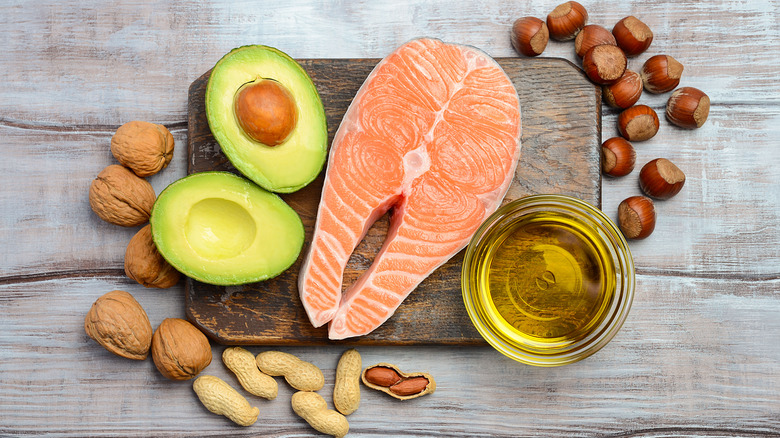What's The Difference Between Saturated And Unsaturated Fat?
When we think of fats in terms of our diet, the word is almost always perceived negatively. But in reality, consuming fat is important to maintaining a healthy diet and body. And while the types of fat you consume do matter, fat's purpose isn't as bad as its reputation suggests — depending on the type of fat, of course.
Why do we need fats in our diet? According to the U.K.'s National Health Service, fats are necessary because they help our bodies break down certain vitamins, such as vitamins A, D, and E. For this reason, you don't want to eliminate fats entirely.
However, there are different types of fat we can consume. Saturated fats, unsaturated fats, and trans fats are all lurking in everyday foods, but the key difference between them comes down to what they do to our bodies. So, what's the real difference between saturated and unsaturated fat?
The difference between saturated and unsaturated fat
Between saturated and unsaturated fats, unsaturated fats are better for you. Healthline explains that consuming too much saturated fat can potentially be bad for heart health (though the outlet stresses that the studies around this haven't created conclusive results). Still, saturated fats are known to raise LDL cholesterol levels over time; high cholesterol can, in turn, lead to heart disease, per WebMD.
Unsaturated fat, meanwhile, is known as "healthy fat," and it comes in two forms: monounsaturated and polyunsaturated. Monounsaturated fats are good for heart health, and polyunsaturated fats are good for helping your muscles and blood, per Healthline. According to the University of Illinois at Urbana-Champaign College of Agricultural, Consumer, and Environmental Sciences Extension, unsaturated fats can help lower cholesterol over time, which could prevent heart attacks and strokes. However, the Extension adds that while these fats are good for you, they should still be consumed in moderation.
Last but not least, trans fats have no nutritional benefits. The American Heart Association explains that, for the most part, trans fats are artificial fats; they're found in foods such as fried foods, pizza, and desserts such as cakes and pies.
Which foods contain healthy fat?
Knowing the types of fat is one thing, but you should also understand how to balance them in your diet. According to the Cleveland Clinic, foods high in saturated fats include red meat, as well as dairy products such as cheese, ice cream, and butter.
Unsaturated fats, meanwhile, are relatively easy to incorporate into your everyday diet. Avocados are a prime example of healthy fat, as are nuts and seeds, per the Cleveland Clinic. Red meat can be swapped for other fat-healthy proteins, such as chicken or fish. Whole grains, such as brown rice and oatmeal, are also a good source of heart-healthy fats.
When it comes to cooking with oil, AMS Cardiology suggests choosing a heart-healthy oil, such as olive oil, avocado oil, or sesame oil. Oils you may want to avoid include canola oil, and vegetable oil, as well as cooking with shortening.


